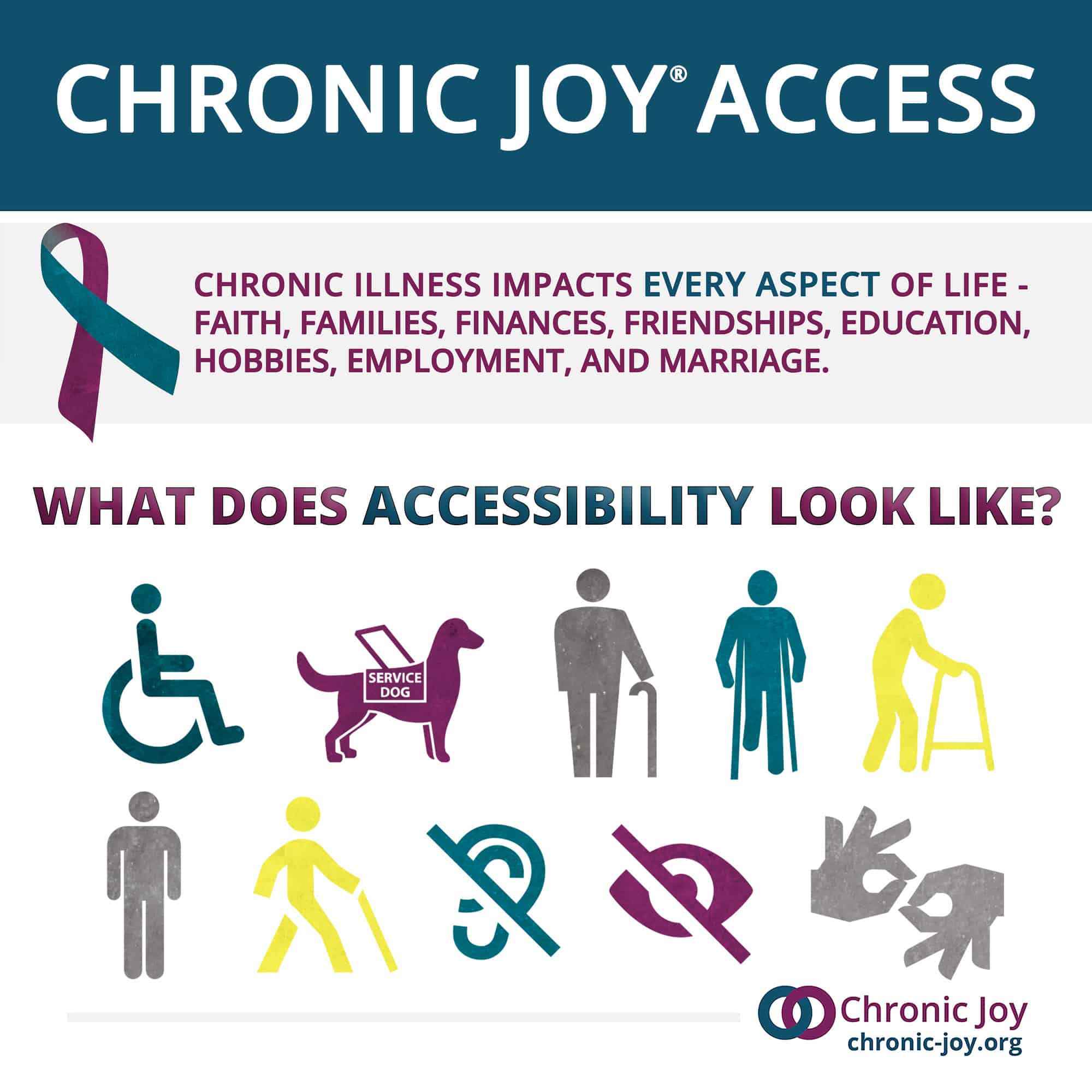
Chronic Joy Access
Opening Doors. Removing Barriers.
Accessibility is an invitation to broaden our perspectives, choosing the simple kindness of including one another, opening doors, and removing barriers.
About Accessibility
Globally, more than 60% of the population lives with one or more chronic illnesses. Almost 96% are characterized as invisible illnesses.
About 15% of the world’s population live with a disability and 10% have a medical condition which is considered a hidden disability.
Hidden and invisible mean showing no outward signs. Accessibility means so much more than being wheelchair-friendly; it’s about removing barriers and taking steps to be more inclusive for a wide range of needs.
Think of the kindness you wish others would show you; do the same for them. (Luke 6:31)
ACCESSIBILITY • KINDNESS IN ACTION
We’ve all experienced what it’s like to be on the outside looking in, wanting to be seen, wanting to be included, wanting to have a close friend, wanting to be part of a dynamic and caring community. The more we are left out, the easier it becomes to insulate ourselves from the pain of rejection and protect our hearts with the armor of separation.
What if, instead, that pain opens a door for us to notice others who are on the fringe, to extend the kindness of a smile, a kind word, or a compassionate welcome? When we include others, we break down barriers and open doors that we wished would have been opened for us.
Each time we choose kindness, our defenses soften a bit.
While no one can truly understand the unique challenges we’ve experienced, those experiences equip us for the mission and ministry God has lovingly planned for each of us.
The ground beneath our own two feet is our mission field, and extending kindness is the foundation of true accessibility.
ACCESSIBILITY REDEFINED
One definition of accessibility is the quality of being suitable or adapted for use by people with disabilities. Yet accessibility means so much more than being wheelchair-friendly.
Being accessible is all about removing barriers and taking steps to be more inclusive of a wide range of needs. It means that we extend a warm and compassionate welcome to each person as if they are an honored guest.
A.W. Tozer wrote, “The love of Jesus is so inclusive that it knows no boundaries.”
As a global resource ministry dedicated to compassionately serving all those affected by chronic illness, mental illness, chronic pain, and disability, our hearts long to not only broaden our collective understanding of accessibility but to also take steps to include all.
Disabilities include:
- Vision impairments
- Mobility restrictions
- Auditory impairments
- Neurological conditions
- Cognitive and learning disabilities
- Medical conditions
- Mental health conditions
- Pain conditions
While the wide range of accessibility needs is daunting, a great place to start is by asking questions. When we extend kindness by asking questions and really listening to the responses, we open doors and begin to break down barriers.
This compassion opens the door to authentic community — and deep down, isn’t that what we all long for?
HOW TO OPEN DOORS OF ACCESSIBILITY
At its core, kindness is selfless and sacrificial. It is leaning into Jesus and listening for His still, small Voice — and it is courageously stepping out in faith as and how He leads, learning to care for and love one another deeply from the heart.
Kindness is a fruit of the Spirit and it is an essential ingredient of a vibrant and growing faith.
Accessibility is kindness in action – the love of God touching hearts and lives through:
- Care
- Compassion
- Courtesy
- Friendliness
- Gentleness
- Goodness
- Grace
- Helpfulness
- Hospitality
- Patience
- Tenderness
- Thoughtfulness
- Understanding
- Unselfishness
- Warmth
ACCESS FOR ALL
Accessibility means choosing to extend and receive kindness. Even the smallest, servant-hearted kindness can be used by God to effect greater change than we may ever know this side of Heaven.
1. Speak a word of hope or encouragement. (1 Thessalonians 5:11)
2. Send a #PenToPaper note to a friend or loved one. (Galatians 6:11)
- #PenToPaper Guide
- #PenToPaper Note Starters
- Print Your Own Sharing Life, Discovering Hope Stationery
3. Comfort someone who is sick or injured. (Luke 10:30-35)
4. Ask questions about how we might serve one another in love. (Proverbs 2:2)
5. Hold the door for the person behind you. (Romans 12:10)
6. Ask for help when you need it and be willing to accept it. (Philippians 4:6)
7. Listen. Listening is the foundation of accessibility. All of us have a story to tell — and all of us have unspoken needs. (Proverbs 20:5)
8. Pray for someone, then call, email, or text them to let them know. (1 Thessalonians 5:17)
- Prayer Pond – Request prayer and pray for others.
- Pray Continually
- Prayers for Small Groups

